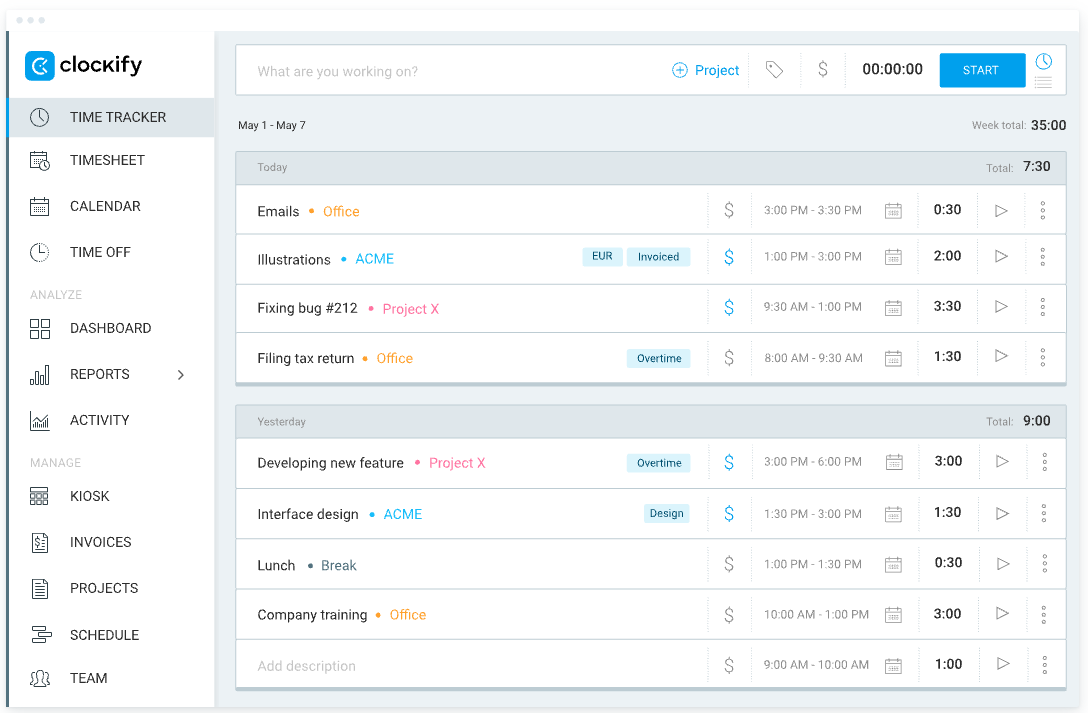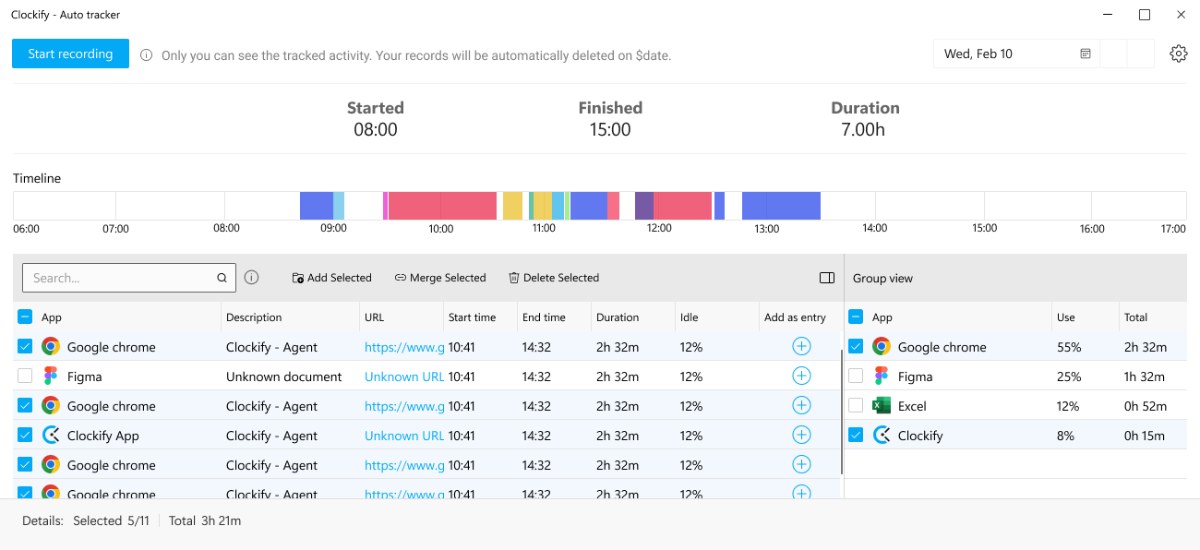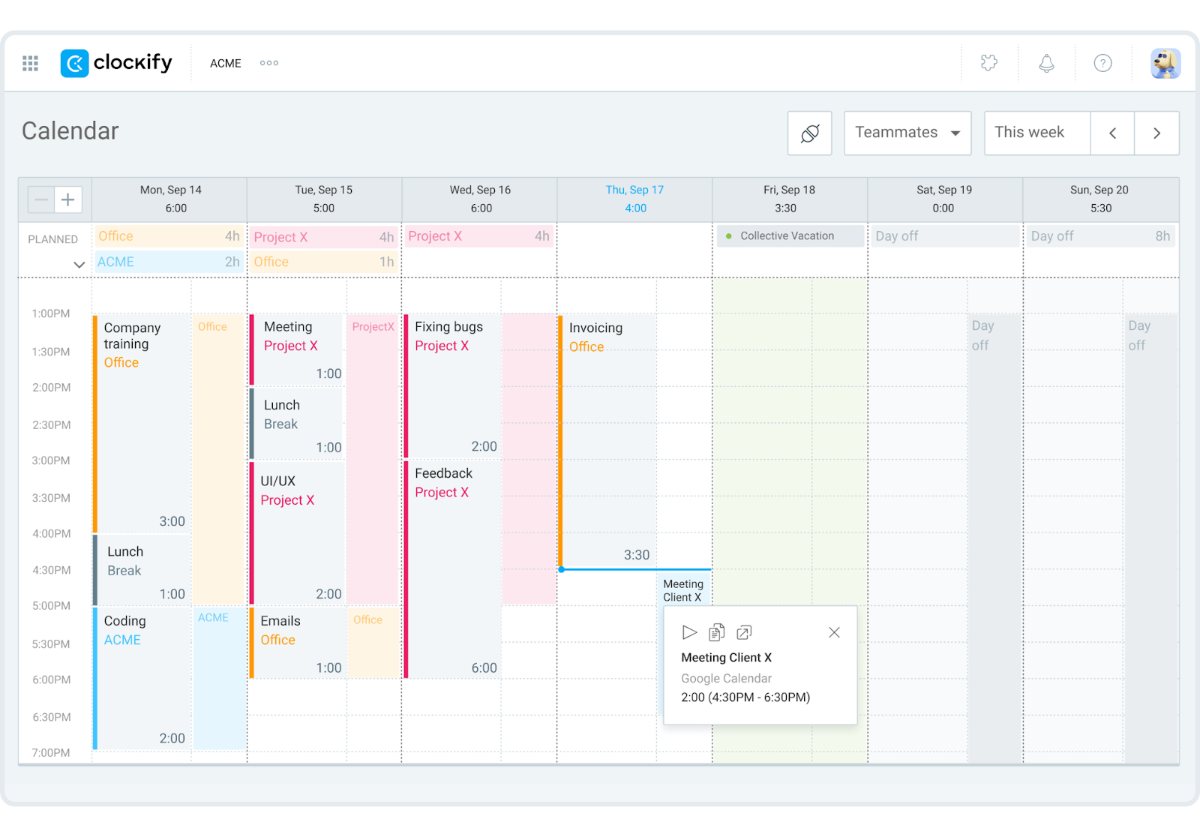Imagine you could:
- Achieve your dreams,
- Travel to exotic locations,
- Land your dream job,
- Finish projects on time,
- Get enough sleep every night, AND
- Spend enough time with loved ones — all in one lifetime!
Yes, it’s possible — with good time management.
Here, you’ll learn about the vital importance of time management and get 10 practical tips from experts.
Let’s begin!

Table of Contents
Why do you need better time management skills?
Knowing how to manage your time effectively brings many benefits to your work routine and overall life. Here are some of the perks of good time management.
Benefit #1: You become more organized and goal-oriented
When you manage time properly, you get more done and save time for activities you truly enjoy.
By being more organized, you’ll easily stick to your plan and complete daily tasks without stressing about them. You won’t have to worry about missing deadlines or forgetting errands, because a detailed schedule minimizes mistakes.
For the founder and Head of Finance of a SaaS company, Valeri Gervaziev, being organized is at the core of time management:

“Having a plan is the cornerstone of good time management. Without a daily, weekly, or long-term plan, it’s all too easy to veer off course.”
When you manage your time properly, you’re also more motivated to stop sitting around and pursue your goals.
As a result of this hard work and newfound motivation, you reach your goals faster.
Manage your time with Clockify
Benefit #2: You improve your work-life balance
With better time management, you get more free time.
More free time means more time to spend with your loved ones, practice a hobby, or even go on a trip abroad. All this results in a healthier work-life balance!
A family law expert and partner at a major LA law firm, Laura Wasser, believes proper time management is the key to lowering workplace stress:

“Time management is a tool for reducing workplace stress and fostering a better work-life balance. It’s like having an explicit, well-documented agreement — everything runs more smoothly when everyone knows what to expect.”
💡 CLOCKIFY PRO TIP
Looking for fun things to do that also help you stay productive? Check out our guide to productive hobbies:
Benefit #3: You feel better in general
When you properly manage time, you’ll finally feel the fulfillment that comes from a completed to-do list. You’ll know that you’re capable of doing anything on your agenda.
As you live up to your expectations and feel more self-confident in your abilities, you’ll also be less stressed. This helps you avoid serious health issues throughout your life, including mental fatigue.
With well-managed work priorities, you can both attend your daughter’s recital and go over some crucial project issues with a client — improving your personal and professional relationships in the long run.
For best-selling author and coach Stacy Ennis, time management matters precisely because it leaves us more time for activities we enjoy:

“Good time/energy management honors the ebb and flow of our bodies and brains and lets us tap into our most productive selves — not in a way that depletes us but rather makes more space in our lives. Win-win!”
Of course, the importance of time management isn’t just apparent in our personal lives. Arguably, it’s even more vital in the workplace.
Why is time management important at work?
So, how does time management help with our work?
To Laura Wasser, time management is as crucial as having a great attorney:

“Time management is as essential as having a good lawyer when you’re facing a court case. It helps you meet deadlines, improves your decision-making ability, and offers a better chance to achieve your career goals.“
With that in mind, let’s take a look at the main benefits of time management in the workplace.
Reason #1: You don’t miss deadlines and appointments
Deadlines and appointments are often difficult to manage.
To stay on track with work and finish on time, you need to start on time and divide your work into manageable chunks.
According to Bryan Clayton, CEO and co-founder of Nashville-based startup, proper time management helps you maintain quality while keeping up with deadlines:

“You can deliver high-quality work on time and within budget. You can meet or exceed your expectations and standards.”
Reason #2: You procrastinate less
When you know you’re working on a fixed schedule with tasks allocated to specific time slots in the day, it’ll be easier for you to focus — because you’ll know you have personal deadlines to meet for each task. Thus, you’ll procrastinate less.
💡 CLOCKIFY PRO TIP
Feel like you’re procrastinating too much and struggling to increase productivity? Check out this guide:
Reason #3: You avoid work-related stress
Racing to beat a deadline is stressful because you don’t know whether you’ll succeed. Over time, increased pressure can lead to more serious problems, such as career burnout.
That’s where the importance of time management shines through. Once you know all your tasks and the specific time you need to finish each of them, it’s easier to single out priorities and make arrangements that help you reduce stress.
Reason #4: You maintain a professional reputation
Missing deadlines, forgetting meetings, and rushing projects are often consequences of poor time management. Over time, these will likely take a toll on your reputation.
When you manage your time properly, you can accomplish what you set out to do — whether it’s paying taxes on time or helping your firm avoid contract penalties. And you’ll do it with a sufficient level of quality. Soon enough, higher-ups, clients, and colleagues will view you as more dependable and professional.
💡 CLOCKIFY PRO TIP
Need help calculating and paying taxes for your freelance work? Check out our detailed guide for independent contractors right here:
Why is efficient time management hard?
According to healthcare industry research, the average American spends over 5 hours on their phone each day. Let’s be honest — most of that time probably isn’t spent on anything productive.
The good news is that you can change this. But before you can stop wasting time, you need to understand why you waste it in the first place.
Some of the most common reasons why people waste time include:
- Lack of clarity — no specific and measurable long-term goals or action plans,
- Lack of motivation — absence of a purpose or incentive to use our time better,
- Lack of discipline — no willpower to resist temptations or distractions, absence of habits or routines that support our goals,
- Lack of skills — absence of knowledge or abilities to do the tasks or activities we need to do, and
- Lack of feedback — no way to measure our progress or results due to the lack of feedback or guidance that can help us improve or fix our mistakes.
So, your first step in preventing time waste is to determine which of these factors specifically affect you. Then, you can start working on them by gradually incorporating some of the tips we’ll present to you in this article.
💡 CLOCKIFY PRO TIP
If you have too much time to finish a task at work — chances are you won’t finish it before the deadline, even if you can. Parkinson’s law explains why:
How to manage time effectively — 10 useful tips and strategies
Once you identify your biggest time wasters, you can start utilizing your time management skills and choose an effective time management strategy.
To help you in this process, we’ve prepared 10 practical time management tips.
💡 CLOCKIFY PRO TIP
There’s always room to improve your time management skills. To dive deep into effective time management, check out this guide:
Manage time better with Clockify
Tip #1: Set your goals
Earl Nightingale, an American radio speaker and author, once said, “People with goals succeed because they know where they’re going.”
Goal-setting is an essential part of time management. Unless you know specifically what you want to achieve, you won’t be able to plan the steps that lead you to success.
If you’re unsure about your overall objectives and didn’t set concrete career goals, you could try journaling your thoughts and dreams over time.
Run through what you’ve written so far, and define your goals — if you were honest about your dreams in your journal, you’ll be able to turn your wants into concrete goals. Having a fixed objective saves you a lot of time and keeps you in a state of deep work.
💡 CLOCKIFY PRO TIP
Looking for the best way to set and track your goals? Give the SMART goals technique a try:
Tip #2: Keep your goals to yourself
According to entrepreneur and author Derek Sivers and several studies, people who declare their goals to the world are statistically less likely to reach said goals.
The reason is simple and tied to the way human incentives work. Essentially, people pursue goals because of the satisfaction they feel when they reach them.
However, people who announce their goals already feel this satisfaction to a degree. That gives them less of an incentive to actually reach the goals in practice.
So, next time you feel the urge to tell someone about your dreams, goals, and aspirations — don’t do it. This might not seem like a logical time management technique, but, statistically, it’s an effective one.
Tip #3: Create a plan
When you make a plan, you’re less likely to lose your way, and thus less likely to fail.
This is where setting goals comes in handy as well. Once you do that, you can list the tasks and actions that help you reach your objectives.
In the process, you’ll realize what matters and what’s just draining your energy. Soon, you’ll do away with anything you believe to be a distraction.
For Milena Tulenčić, a software developer at Clockify, daily journaling is the best way to organize goals in her calendar:

“My most helpful time management hack is writing my plan in a journal. At the end of the workday, I like to write down all the tasks I have to do tomorrow and try to make a schedule for myself for that day. I always leave some room for unforeseen situations and try not to overload my schedule.”
💡 CLOCKIFY PRO TIP
Struggling to create practical, consistent plans? Try some of our free templates for time blocks:
Tip #4: Make small decisions every day
According to a quote by Roy T. Bennett, author of The Light in the Heart, “Maturity is when you stop complaining and making excuses in your life; you realize everything that happens in life is a result of the previous choice you’ve made and start making new choices to change your life.”
Unless you make up your mind about the road you want to take, you’ll hardly ever make it past the intersection. But, as waiting around and procrastinating get you nowhere, you should muster the courage and make a choice.
In her Harvard Business Review article, leadership keynote speaker and writer Sabina Nawaz recommends starting small when making decisions. She believes big goals are achieved through micro-decisions we make daily.
So, if you’re unsure about a decision, ask yourself, “What’s the very first step I need to take that will get me to the next point in my plan?”
Tip #5: Focus on important tasks first
If you let your mind wander off, you’ll never become efficient with your tasks — you need to focus. But we’ve only got so much productive energy each day. So, you need to prioritize crucial tasks first.
Laura Wasser recommends following the concept of “eating the frog:”

“It’s about tackling the most challenging task first thing in the morning, like dealing with the most contentious issue in a negotiation right out of the gate. Once that’s out of the way, the rest of the day tends to feel much more manageable.”
💡 CLOCKIFY PRO TIP
Struggling to juggle multiple tasks at the same time? Here’s a guide to multitasking without losing focus:
Tip #6: Minimize distractions
While eliminating distractions is essential for proper time management, it’s easier said than done — especially since we’re constantly bombarded with content on our phones and computers.
Best-selling author and strategist Stacy Ennis suggests turning off all notifications while working:

“The number of people who have chimes going off all day is complete madness! How can anyone focus with beeps and bings all day? Turn off ALL notifications on your phone and computer, except for silent notifications for texts. Email notifications on the phone — even silent ones — is a big no as well.”
She also suggests buying earplugs to help fight distractions:

“This is my #1 productivity hack that enables me to work in ANY space, including my own home when my kids are being exceptionally loud. Simple Mack’s earplugs from Amazon do the trick — no need for fancy Bose noise-canceling headphones.”
💡 CLOCKIFY PRO TIP
Looking for other ways to minimize distractions and focus on your work? Here are 20 effective methods you can try:
Tip #7: Make sure to rest
Getting enough sleep and taking regular breaks is just as important as properly scheduling your tasks. You’ll be much more efficient when you’re well-rested. Moreover, you’ll avoid feeling overwhelmed and overworked!
When you work remotely, committing to work-free weekends and setting boundaries between your professional and personal lives is essential. You need these boundaries to truly rest when you’re off work and prepare for new challenges.
Aside from quality sleep, setting boundaries, and taking breaks, you can introduce end-of-workday rituals to reduce the tension after a long day.
Tip #8: Find an organization technique that works
American polymath Benjamin Franklin once declared, “For every minute spent in organizing, an hour is earned.”
There are plenty of effective organization methods and frameworks you can try:
- Start with the Eisenhower Matrix — the solution that lets you distinguish the important from the urgent (but not important),
- Use the Pomodoro technique — great for taming serial procrastinators, or
- Implement a simple yet effective technique, such as time blocking — it works best in the context of taking control of your time and achieving a better work-life balance.
Furthermore, Bryan Clayton recommends sticking to the Pareto principle:

“The Pareto principle says that 80% of the results come from 20% of the efforts. Find out the 20% of tasks that will bring you the most value or impact for your goals. Focus on those tasks first and do them well. Eliminate or delegate the rest of the tasks that aren’t essential or relevant.”
💡 CLOCKIFY PRO TIP
Need more help managing your time and staying productive? You need to know exactly where you’re wasting time. Check out our guide to best practices in time tracking:
Tip #9: Track the time you spend on tasks
We’re often pressed for time, so the way we spend it should be optimized. This is where tracking the time we spend on tasks comes in handy. These days, the most efficient way to do this is via time tracking software.
For example, Clockify is a time management software that helps you track your time easily and effectively. The software offers a range of useful features, including a time tracker, calendar, and scheduling tools — all of which can help you stay organized and on top of your tasks.

Stacy Ennis recommends Clockify to anyone looking to add more order to their schedule:

“I encourage people to think of energy management and focus on blocking their days to support their best use of energy. One of the first ways to uncover this is by tracking one’s time — and Clockify is a great tool to do so!”
💡 CLOCKIFY PRO TIP
Still struggling to organize your workday in a way that maximizes your productivity? Check out our guide to creating order in your daily work:
Tip #10: Work on your weaknesses and ask for help
You can’t be the best at everything. But once you determine your weaknesses, you can:
- Work on strengthening those skills,
- Delegate some of your tasks, and
- Rely on time management tools designed to make your daily activities easier.
For example, communicating and collaborating with peers and colleagues helps you do more in less time — because there’s more of you doing it.
The same goes for your friends and family. You can save a lot of time if you just let your loved ones help you, either directly or with their advice and guidance.
There are also great tools that can help you work on some of your weaknesses. Junior Java Developer at Clockify, Milana Todorović, explains the value of finding tools that suit your needs:

“Determine your weaknesses and find things that help you with specific time management problems. My biggest issue is remembering what I need or want to do, so the most useful time management techniques for me include tools that helps me remember my tasks.”
Frequently asked questions about time management
Now that you understand the importance of time management, let’s go over some of the Internet’s most common questions on the topic.
Why is time management so important?
Simply put, time management helps you take control of your day. It makes it easier to sort through priorities, stay focused, and complete tasks without constantly feeling behind.
When you manage your time well, you stress less, work smarter, and reach your goals consistently — both at work and in your personal life.
What are the 5 P’s of time management?
There are plenty of time management frameworks, but the one based on the 5 P’s has become one of the most popular choices:
- Prioritize — figure out what matters most and do that first,
- Plan — break down your week or day into a clear list or schedule,
- Prepare — do the necessary research or other prep work before you start,
- Pace — give yourself enough time to follow through on each planned task, and
- Persist — stick to your plan and refine your approach along the way.
This cycle helps you stay consistent without burning out.
What is the biggest benefit of time management?
The biggest benefit is simple: less stress.
When you know your priorities and have a clear plan, everything is more doable. As a result, you spend a lot less time worrying and a lot more time actually getting things done, every day. And this also makes your work more satisfying.
How does time management impact work-life balance?
According to a survey by The Muse, most workers see work-life balance as the ability to dedicate time to personal needs during a workday, when necessary.
In that context, proper time management is essential because it helps you pivot away from work if you need to. If you complete all your tasks on time or ahead of schedule, you can take some time off without endangering your career.
Also, when you have enough time to deal with personal matters, you’re less stressed when you go into work — making it easier to focus on difficult tasks.
What are the consequences of poor time management?
Bad time management negatively impacts every aspect of your work. You miss deadlines and rush through important work. That often leads to more stress and lower-quality results.
Over time, this hurts your professional reputation. Colleagues, clients, and bosses start seeing you as undependable. Unfortunately, this also lowers your self-confidence — creating a vicious cycle of subpar performance.
💡 CLOCKIFY PRO TIP
How well do employees and students manage their time in practice? Check out our deep dive into the latest time management statistics here:
Manage your time better with Clockify
Clockify can help you cut down on procrastination, focus on what actually matters, and stay productive in the long run.
The platform’s auto tracker can automatically monitor programs and websites you use for longer than 10 seconds, and provide a real-time visual breakdown.

With Clockify, you’ll always know precisely what you spend your time on.
And if you want to compare the tracked time to your plans and see how efficient you really are — connect Clockify to your Google Calendar.

Clockify has its own built-in calendar that shows your time entries in daily, weekly, or monthly views. But if you connect it to your Google Calendar, Clockify’s calendar will also show your planned events and tracked time side by side.
As a result, you’ll always know how good you are at sticking to your plans — and how well you’ve estimated the time you need for different tasks.
With Clockify, you can say farewell to last-minute chaos and missed deadlines. It’s time to take the first step towards a more productive you.



